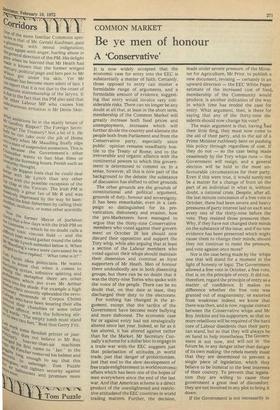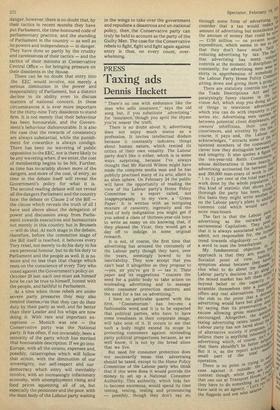COMMON MARKET
Be ye men of honour
A 'Conservative'
It is now widely accepted that the economic case for entry into the EEC is substantially a matter of faith. Certainly, those opposed to entry can muster a formidable range of arguments, and a formidable amount of evidence, suggesting that entry would involve very considerable risks. There can no longer be any doubt at all that, at least in the short term, membership of the Common Market will greatly increase both food prices and unemployment, increases which will further divide the country and alienate the people both from Parliament and from the Conservative party, especially since public opinion remains steadfastly hostile to the Treaty of Rome, and to the irreversible and organic alliance with the continental powers to which this government is determined to commit us. In a sense, however, all this is now part of the background to the debate: the substance of discussion has shifted to other grounds.
The other grounds are the grounds of constitutional and political argument, grounds of duty, honour and sovereignty. It has been remarkable, even in a campaign so distinguished for its prevarication, dishonesty and evasion, how the pro-Marketeers have managed to argue that the thirty-nine Conservative members who voted against their government on October 28 last should now discard their opposition and support the Tory whip, while also arguing that at least a section of the Labour members who voted against their whips should maintain their dissension and continue as loyal supporters of Mr Heath. Men of honour there undoubtedly are in both dissenting groups, but there can be no doubt that it was the thirty-nine Tories who spoke with the voice of the people. There can be no doubt that, on that date at least, they discharged their duty to the electorate.
For nothing has changed in the argument, except that the tactics of the Government have become more bullying and more dishonest. The economic case for or against entry had not strategically altered since last year. Indeed, so far as it has altered, it has altered against rather than for the Market. Mr Secretary Connally's scheme for a dollar bloc to engage in a trade war with the EEC suggests just that polarisation of attitudes in world trade, just that danger of protectionism, just that end to the slow development of free trade enlightenment in world economic affairs which has been one of the hopes of men everywhere since the end of the last war. And that American scheme is a direct product of the unenlightened and restrictive attitudesof the EEC countries in world trading matters. Further, the decision, made under severe pressure, of the Minister for Agriculture, Mr Prior, to publish a new document, revising — certainly in an upward direction — the EEC White Paper estimate of the increased cost of food, membership of the Community would produce, is another indication of the way in which time has eroded the case for entry. What argument, then, is there for saying that any of the thirty-nine dissidents should now change his vote?
The main argument is that, having had their little fling, they must now come to the aid of their party, and to the aid of a Prime Minister ruthlessly bent on pushing this policy through regardless of cost. If they do not — so the case being made ceaselessly by the Tory whips runs — the Government will resign, and a general election will be held in the most unfavourable circumstances for their party. Even if this were true, it would surely not be a matter for a change of front on the part of an individual in what is, without doubt, a national crisis. Despite, after all, the last minute concession of a free vote in October, there had been severe and heavy pressures of party interest laid on each and every one of the thirty-nine before the vote. They resisted those pressures then. Why, if they have not changed their minds on the substance of the issue, and if no new evidence has been presented which might cause them to change their minds, should they not continue to resist the pressure, and vote against once more?
Nor is the case being made by the whips one that will stand for a moment in the light of honesty or logic. The Government allowed a free vote in October, a free vote, that is, on the principle of entry. It did not, therefore, regard the principle of entry as a matter of confidence. It makes no difference whether the free vote was granted out of magnanimity, or extorted from weakness: indeed, we know that there was then, and is now, regular contact between the Conservative whips and Mr Roy Jenkins and his supporters, so that no more rebellions will be required of the hard core of Labour dissidents than their party can stand, but so that they will always be on hand to help nonetheless. The Government is not now, and will not in the future be, in any danger other than danger of its own making: the rebels merely insist that they are determined to prevent a single piece of legislation, which they believe to be inimical to the best interests of their country. To prevent that legislation they are willing to cause their government a great deal of discomfort: they are not involved in any plot to bring it down.
If the Government is not necessarily in
danger, however, there is no doubt that, by their tactics in recent months they have put Parliament, the time-honoured code of parliamentary practice, and the standing of Parliament in the country — as well as , its powers and independence — in danger. They have done so partly by the crudity and carelessness of their tactics — and the tactics of their minions at Conservative Central Office — for bringing pressure on their dissidents in the House.
There can be no doubt that entry into the EEC would involve, not merely a serious diminution in the power and responsibility of Parliament, but a distinct decline in its ability even to discuss matters of national concern. In these circumstances it is ever more important for the thirty-nine Tory dissidents to stand firm. It is not merely that their behaviour has been honourable, and the Government's behaviour dishonourable. It is also the case that the rewards of consistency are always substantial, while the punishment for cowardice is always condign. There has been no wavering of public opposition to the EEC, nor is there likely to be any wavering when, if we enter, the cost of membership begins to be felt. Further, as time has invariably shown more of the dangers, and more of the cost, of entry, so time in the debate itself will reveal the Government's policy for what it is. The second reading debate will not reveal all the dangers Parliament and the country face: the debate on Clause 2 of the Bill — the clause which reveals the truth of all I have said above about the delegation of power and discussion away from Parliament towards executives and bureaucrats not merely in this country but in Brussels — will do that. At each stage in the debate, therefore, before the committee stage of the Bill itself is reached, it behoves every Tory rebel, not merely to do his duty to his own personal honour, but to do his duty to Parliament and the people as well. It is no more and no less than that charge which rests on the conscience of every Tory who voted against the Government's policy on October 28 last: each one must ask himself how he can be true to himself, honest with the people, and faithful to Parliament.
At a time when those rebel k are under severe party pressures they may also remind themscives that they can do their duty by their party as well, and far better than their Leader and his whips are now doing it. With rare and important exceptions — Munich was one — the Conservative party was the National party. It has often, if not invariably, been a minority of the party which has merited that honourable description. If we go into Europe, with all the strains, expenses and, possibly, catastrophes which will follow that action, with the diminution of our sovereignty, our self-respect and our democracy which entry will inevitably involve, with an increasingly inflationary economy, with unemployment rising and food prices squeezing all of us, but especially the pensioner and the poor, with the main body of the Labour party waiting in the wings to take over the government and repudiate a disastrous and un-national policy, then, the Conservative party can truly be held to account as the party of the Guilty Men. The case for the Conservative rebels to fight, fight and fight again against entry is thus, on every count, overwhelming.











































 Previous page
Previous page